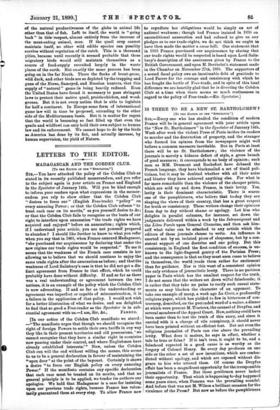LETTERS TO THE EDITOR.
MADAGASCAR AND THE COBDEN CLUB.
[To TEE EDITOR OP TER " SrscTivroa."] Sin,—You have attacked the policy of the Cobden Club as stated in its recently published memorandum, and you refer to the subject again in your article on France and England in the Spectator of January 14th. Will you be kind enough to inform your readers upon what expressions in the memor- andum you rely to show either that the Cobden Club " desires to force our" (English Free-trade) "policy" on every annexing Power; or that the Cobden Club refuses " to treat each case on its merits," as you yourself desire to do; or that the Cobden Club fails to recognise as the basis of our right to interfere upon annexation "the trade rights we have acquired and enjoyed" before an annexation ; rights which, if I understand your article, you are not yourself prepared to abandon P I should like further to know to what you refer when you say that in 1895, when France annexed Madagascar, "she purchased our acquiescence by declaring that under the new regime our trade rights would be respected." To me it seems that the weakness of the French case consists in her allowing us to believe that we should continue to enjoy the same trade rights after the annexation as before; and that the weakness of Lord Salisbury's case is that he did not get a dis- tinct agreement from France to that effect, which he could probably have done without difficulty. If and so far as there was a real understanding or agreement between the two nations, it is an example of the policy which the Cobden Club is now advocating. If and so far as the understanding or agreement was imperfect or capable of misconstruction, it is a failure in the application of that policy. I would not wish for a better illustration of what we desire, and am delighted to find that so good a Free-trader as the Spectator is in sub- stantial agreement with ne.—I am, Sir, &c., FARBER.
[In our notice of the Cobden Club manifesto we stated : —" The manifesto urges that though we should recognise the right of foreign Powers to settle their own tariffs in any way they like in their present territories and old possessions, ' we cannot recognise that they have a similar right in countries now passing under their control, and where Englishmen have already established interests.' " Now, unless the Cobden Club can will the end without willing the means, this seems to us to be a general declaration in favour of maintaining the "open door" at the point of the bayonet. Certainly it shows a desire "to force our English policy on every annexing Power." If the manifesto contains any specific declaration that each case must be treated on its merits, and that no general principle is to be applied, we tender its authors our apologies. We hold that Madagascar is a case for insisting upon our previous trade rights, because France has volun- tarily guaranteed them at every step. To allow France now
to repudiate her obligations would be simply an act of national weakness ; though had France insisted in 1890 on unconditional annexation and had refused to give us any pledges as to our trade-rights, we do not think we ought to have then made the matter a casus belli. Our statement that in 1895 France purchased our acquiescence by stating that our trade rights would be respected is based upon Lord Salis- bury's description of the assurances given by France to the British Government, and upon M. Berthelot's statement made in the Chamber on November 27th, 1895. The supporters of a sound fiscal policy owe an inestimable debt of gratitude to Lord Farrer for the courage and consistency with which he has fought the battle of Free-trade, and in spite of this local difference we are heartily glad that he is directing the Cobden Club at a time when there seems so much restlessness in regard to the policy of Free-trade.—En. Spectator.]


































 Previous page
Previous page